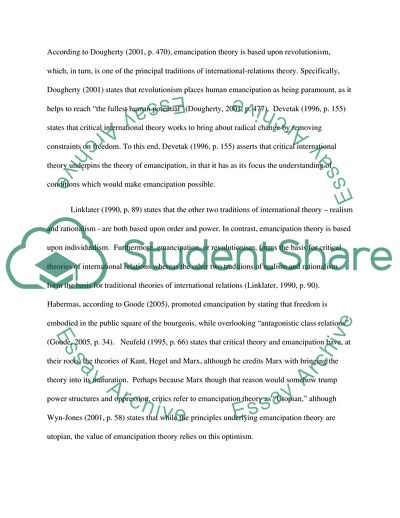Cite this document
(With Reference to the Arab Spring, Assess the Utility of the Foucauldian Notion of Resistance Essay Example | Topics and Well Written Essays - 2000 words - 1, n.d.)
With Reference to the Arab Spring, Assess the Utility of the Foucauldian Notion of Resistance Essay Example | Topics and Well Written Essays - 2000 words - 1. https://studentshare.org/politics/1777253-with-reference-to-the-arab-spring-assess-the-utility-of-the-foucauldian-notion-of-resistance-as-opposed-to-the-critical-theory-concept-of-emancipation
With Reference to the Arab Spring, Assess the Utility of the Foucauldian Notion of Resistance Essay Example | Topics and Well Written Essays - 2000 words - 1. https://studentshare.org/politics/1777253-with-reference-to-the-arab-spring-assess-the-utility-of-the-foucauldian-notion-of-resistance-as-opposed-to-the-critical-theory-concept-of-emancipation
(With Reference to the Arab Spring, Assess the Utility of the Foucauldian Notion of Resistance Essay Example | Topics and Well Written Essays - 2000 Words - 1)
With Reference to the Arab Spring, Assess the Utility of the Foucauldian Notion of Resistance Essay Example | Topics and Well Written Essays - 2000 Words - 1. https://studentshare.org/politics/1777253-with-reference-to-the-arab-spring-assess-the-utility-of-the-foucauldian-notion-of-resistance-as-opposed-to-the-critical-theory-concept-of-emancipation.
With Reference to the Arab Spring, Assess the Utility of the Foucauldian Notion of Resistance Essay Example | Topics and Well Written Essays - 2000 Words - 1. https://studentshare.org/politics/1777253-with-reference-to-the-arab-spring-assess-the-utility-of-the-foucauldian-notion-of-resistance-as-opposed-to-the-critical-theory-concept-of-emancipation.
“With Reference to the Arab Spring, Assess the Utility of the Foucauldian Notion of Resistance Essay Example | Topics and Well Written Essays - 2000 Words - 1”. https://studentshare.org/politics/1777253-with-reference-to-the-arab-spring-assess-the-utility-of-the-foucauldian-notion-of-resistance-as-opposed-to-the-critical-theory-concept-of-emancipation.


